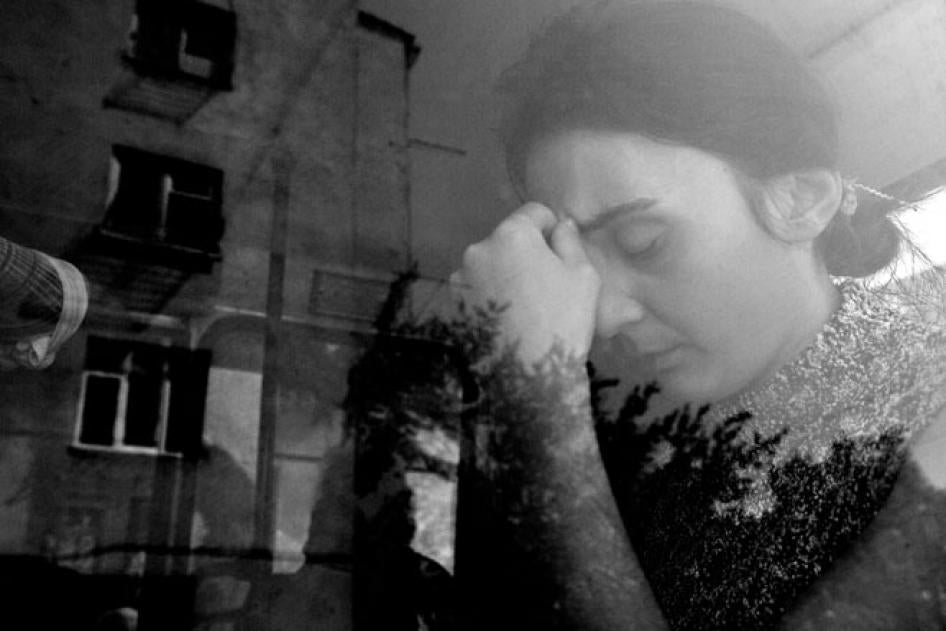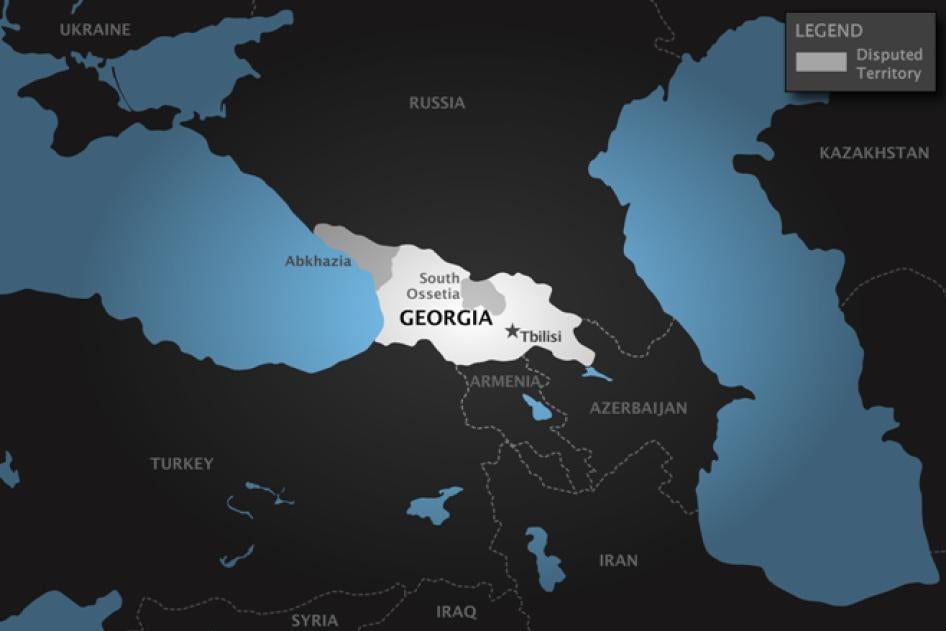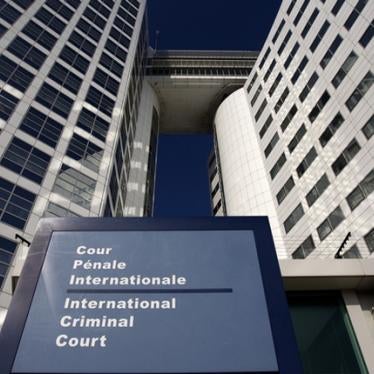The International Criminal Court (ICC) prosecutor, Fatou Bensouda, on October 13, 2015 requested authorization from the court’s judges to open an investigation into crimes committed during the August 2008 conflict in Georgia between its armed forces, militias in the breakaway South Ossetia region, and Russian forces.
Since shortly after the week-long armed conflict ended, on August 15, 2008, the office of the ICC prosecutor has been analyzing alleged crimes committed during the war in what is known as a “preliminary examination.” During this examination, the prosecutor’s office did not have full investigative powers, but relied instead on materials received from governments, including, in this case, the Georgian and Russian governments, as well as information from intergovernmental and nongovernmental organizations. If granted, the application would allow the prosecution to conduct a full investigation into alleged crimes committed by all parties to the conflict.
Related Content
Human Rights Watch was on the ground during the conflict and in the months afterward to document violations of international humanitarian law and human rights law by all sides. In January 2009, Human Rights Watch issued a comprehensive report, “Up In Flames: Humanitarian Law Violations and Civilian Victims in the Conflict over South Ossetia,” about violations by all sides.
The ICC is a permanent international criminal court, with headquarters in The Hague. It is a treaty-based court, independent of the United Nations. It has 123 member countries, including Georgia. Georgia ratified the ICC treaty, the Rome Statute, in 2003, giving the court jurisdiction over crimes of genocide, war crimes, and crimes against humanity committed in Georgia or by Georgian nationals beginning on December 1, 2003.
The following questions and answers concern the prosecutor’s request to open an investigation and next steps.
1. Has the ICC opened an investigation into the Georgia/Russia conflict?
No. At this stage the court’s prosecutor is seeking permission from the ICC judges to investigate.
2. Why does the ICC prosecutor need the judges’ permission to investigate?
ICC investigations can be triggered in one of three ways. Two of these triggers require a referral by either the UN Security Council or an ICC member country. But the ICC prosecutor can also open an investigation on her own motion, without such a referral.
If the prosecutor seeks to act on her own motion, an ICC pretrial chamber, consisting of three judges, must first authorize the investigation. The prosecutor is asking the judges to authorize the investigation because neither the UN Security Council, nor Georgia or any other ICC member country has asked the ICC prosecutor to investigate the 2008 conflict.
3. What is the ICC prosecutor seeking to investigate?
The ICC prosecution is seeking to investigate allegations of crimes against humanity and war crimes committed in Georgia between August and October 2008. The prosecutor has asked for permission to investigate events taking place from July 1, 2008, however, which precede the dates of the alleged crimes but which the prosecution indicates in its application may be relevant to establishing the existence of crimes against humanity and war crimes.
Based on the information available so far, the prosecutor has determined that there is a reasonable basis to believe that South Ossetian forces committed the crimes against humanity of murder, deportation, and persecution as well as the war crimes of murder, destroying the enemy’s property (or the property of an adversary), and pillage in a campaign to push ethnic Georgians out of South Ossetia.
The prosecution has also determined that there is a reasonable basis to believe that an alleged August 7-8 attack on Russian peacekeepers – by Georgian forces – and an alleged August 7 attack on Georgian peacekeepers – by South Ossetian forces – amount to the war crime of attacking personnel or objects involved in a peacekeeping mission.
The prosecution’s application also refers to other alleged crimes, including indiscriminate and disproportionate attacks by Georgian and Russian armed forces that failed to distinguish civilian targets and a limited number of cases of sexual and gender-based violence. The prosecution has not been able to reach a determination as to whether these allegations amount to crimes within the ICC’s jurisdiction. It notes, however, that the allegations may be subject to investigation should the court’s judges authorize opening an investigation in Georgia.
4. Will the allegations the prosecutor has identified in the October 13, 2015 application form the basis for future prosecutions?
Not necessarily. If the judges authorize an investigation, the prosecution will conduct a full investigation to determine what, if any, cases to bring before the court.
5. If an investigation is authorized, will the ICC prosecutor be able to press charges against Georgian or Russian officials suspected of responsibility for starting the conflict?
No. Although the crime of aggression, that is, waging aggressive war, is contained within the Rome Statute, the court’s jurisdiction over the crime has not been activated. The court will not be able to exercise jurisdiction over the crime of aggression until at least 2017, and, if activated, the court’s jurisdiction over the crime of aggression will only apply to cases that occur after the jurisdiction is active.
Human Rights Watch does not take a position on the lawfulness of waging war. Human Rights Watch believes that strict neutrality makes the organization most effective as a human rights organization. A neutral approach allows Human Rights Watch to focus on the conduct of armed forces in war without taking sides, and thereby promote the goal of encouraging all parties to a conflict to respect international humanitarian law.
6. What is the difference between a crime against humanity and a war crime?
War crimes under the Rome Statute refer to certain serious violations of international humanitarian law, or the laws of war. The court has jurisdiction over these crimes particularly where they have been committed as “part of a plan or policy or as part of a large-scale commission of such crimes.”
The treaty contains a list of the war crimes within the court’s jurisdiction, with some differences between crimes committed in international and non-international armed conflicts. The August 2008 conflict had elements of both – a non-international armed conflict between the Georgian forces and South Ossetian forces, which was internationalized with the involvement of Russian forces.
In both international and non-international armed conflicts, the fundamental tenets of international humanitarian law are the same. While humanitarian law recognizes that some civilian casualties are inevitable, it imposes a duty on warring parties at all times to distinguish between combatants and civilians, and to target only combatants and other military objectives.
A crime against humanity is one of a number of acts – such as murder, torture, rape, or deportation – committed as part of a “widespread or systematic attack directed against any civilian population, with knowledge of the attack.” Crimes against humanity can take place during war, but they can also take place outside of the context of war. For a crime against humanity to be prosecuted under the Rome Statute, the statute requires that the “attack” was committed pursuant to the policy or organization.
7. What happens next? What factors will the ICC’s judges consider in deciding whether to approve an investigation?
The ICC pretrial chamber will consider whether to authorize the prosecutor’s investigation, including the following factors:
- Whether there is a reasonable basis to believe that a crime within the jurisdiction of the court has been committed;
- Whether national authorities have shown themselves to be unable or unwilling to carry out genuine investigations or prosecutions, given that the ICC is a court of last resort and will only step in if there are no genuine national proceedings;
- Whether the case is of sufficient gravity to justify further action by the ICC; and
- Whether, taking into account the gravity of alleged crimes and the interests of victims, there are nonetheless substantial reasons to believe that an investigation would not serve the interests of justice and therefore the ICC should not step in.
In making their decision, the judges will rely on the prosecutor’s application and supporting materials, as well as information it receives from victims (see below). The judges may ask the prosecutor or victims to provide additional material.
There is no time frame for this decision under the Rome Statute, but in the Kenya and Côte d’Ivoire situations, judges took about four months to come to a final decision. The judges may authorize an investigation of all or any part of the prosecution’s application.
8. Will victims have an opportunity at this point to make their views known to the judges?
Yes. Judges can consider information provided in writing to the pretrial chamber by victims – that is, by people harmed by the commission of a crime falling within the court’s jurisdiction.
The prosecution must provide notice to victims known to it of its intention to seek authorization to investigate. The prosecution can provide a general notice to groups of victims, for example, by publishing the notice in the newspaper.
The judges may also order specialized units of the court to carry out specific activities to inform victims about their ability to provide information voluntarily to the court. Human Rights Watch recommends that the judges consider asking the court’s registry to undertake activities to ensure that victims are aware of the purpose of and procedure for providing information to the court. This could also be an important opportunity to provide the general population with basic information about the ICC.
9. Since the ICC is a court of last resort, have there been investigations into these crimes in either Georgia or Russia?
According to reports issued by the Office of the Prosecutor over the course of its preliminary examination of the situation, both Georgian and Russian authorities have undertaken investigations into alleged crimes committed during the conflict.
Russian authorities, the prosecution indicates, have excluded crimes attributed to South Ossetian forces from their investigations, which have focused instead on alleged attacks on civilians who hold Russian passports and on Russian peacekeepers, as well as allegations made against Russian servicemen. During the armed conflict in 2008, Russia exercised effective control over South Ossetia and therefore should have investigated and held accountable any South Ossetian forces responsible for war crimes and other violations of international humanitarian and human rights law.
With regard to Georgian investigations, the ICC prosecution cites a lack of access to South Ossetia, a lack of mutual legal assistance from Russia, and frequent turnover in the leadership of Georgia’s Chief Prosecutor’s Office as obstacles to genuine national prosecutions.
Human Rights Watch is not aware of any cases related to the August 2008 conflict that have come to trial.
10. Since Russia is not an ICC member country, can the ICC prosecutor investigate allegations against Russian nationals for crimes committed in South Ossetia?
The ICC has jurisdiction over crimes committed on the territory of states parties, like Georgia, regardless of the nationality of those who allegedly committed the crimes. This means that the ICC’s jurisdiction over Rome Statute crimes extends to crimes committed or directed to be committed by Russian nationals on Georgia’s territory. As a matter of international law, South Ossetia is a part of Georgian territory.
If the court authorizes an ICC investigation, the Georgian government, as an ICC member country, will be obligated to cooperate fully with the court. Russian authorities will not be bound by this same obligation. The ICC relies on state cooperation for many aspects of its mandate, including access to crime scenes, witnesses, and arrests.
11. Will the ICC open investigations into the conflict in eastern Ukraine?
The ICC prosecutor is considering whether to initiate a formal investigation into alleged crimes committed in Ukraine. Ukraine is not an ICC member country, but the government has made two declarations accepting the court’s jurisdiction, one over alleged crimes committed between November 2013 and February 2014, during the Maidan uprising in Kiev, and, more recently, in September 2015, to extend the court’s jurisdiction over alleged crimes committed in Ukraine since February 2014. The conflict in eastern Ukraine began in spring 2014.
The decision to seek the judges’ authorization to investigate in Georgia, however, has no effect on the prosecution’s ongoing examination of the situation in Ukraine.
12. Is it significant that this would be the first ICC investigation outside of Africa?
Since it began operations in 2003, the ICC’s investigations have concerned eight African countries. The ICC prosecution is examining a number of situations outside of Africa – including in Palestine – to determine whether to open a formal investigation. But it has been accused of unfairly targeting African leaders for prosecution, particularly following the initiation of ICC cases against President Omar al-Bashir of Sudan and the now president and deputy president of Kenya, Uhuru Kenyatta and William Ruto.
This criticism is not valid. African countries make up the largest regional block of ICC member countries. In five countries – Central African Republic, Côte d’Ivoire, Democratic Republic of Congo, Uganda, and Mali – the ICC prosecutor began investigations following the request or grant of jurisdiction of the concerned governments. In two other countries – Darfur, Sudan, and Libya – the ICC prosecutor acted only following a referral on behalf of the international community by the UN Security Council. In Kenya, the ICC prosecutor received the authorization of an ICC pretrial chamber to open investigations.
Some political leaders in Africa have opposed the reach of accountability and have tried to distort the court’s mission by depicting it as a neo-colonialist tool.
Nongovernmental organizations from across Africa and many African governments expressed strong support for the court’s mandate at last year’s annual meeting of ICC member countries. The court’s prosecutor, vice president, and a number of other court officials are African, as is the president of the court’s Assembly of States Parties, Sidiki Kaba, the Senegalese justice minister.
At the same time, international justice has been applied unevenly. Powerful countries and their allies have often evaded justice when serious crimes are committed on their territories. This is due partly to the failure of some countries to join the ICC and the role of the UN Security Council in determining which situations to refer to the ICC when serious crimes are committed in countries that are not ICC members. Human Rights Watch campaigns for justice wherever serious crimes are committed, irrespective of political considerations.
The ICC prosecution has made clear that regional balance is not a factor it considers in the selection of situations. Nor should it be. Since the ICC is an international court operating in what are often highly politicized contexts, the prosecutor and the court need to be clear in their decision-making that the court is an independent, judicial institution.
Nonetheless, if ICC judges authorize an investigation in the situation in Georgia, it will be the first ICC investigation outside of Africa and will bring new constituencies in contact with the court. This makes it all the more important for the court to undertake communications activities in Georgia to raise awareness about the court and its proceedings.
13. How will people in Georgia and Russia learn about what the ICC is doing regarding the August 2008 conflict?
The ICC needs to make every effort to provide information to communities affected by the alleged crimes covered by the prosecutor’s application.
Georgia has been an ICC member country since 2003. The prosecutor has been considering whether to open an investigation into the August 2008 conflict since shortly after it ended, and has made a number of working visits to the country. Independent groups in Georgia have taken an active interest in the court. But it is likely that the general population is not fully familiar with the ICC, or with its specific procedures, which can seem technical and complicated and may differ in many respects from those of national courts.
Experience from other ICC situation countries indicates that a lack of information about the court can lead to misconceptions, as well as raise inaccurate expectations regarding ICC action. A vacuum of objective information can also leave the court vulnerable to deliberate distortion and politicization of its mandate by those who may be investigated or brought before the court. This may be a particular risk here given the politically charged context of the August 2008 conflict between Russia and Georgia, as well as the overall political climate and continued, contested status of South Ossetia.
Misconceptions and misinformation can be difficult for the court to challenge later. If an investigation is authorized in Georgia, they will raise obstacles to the delivery of neutral information about future court proceedings.
ICC staff have considerable expertise in conducting public information and outreach activities in the court’s situation countries, and, rather than waiting until the judges take a decision about an investigation, should immediately begin public information and outreach activities in Georgia, and should consider how best to reach affected individuals in Russia. Staff should seek to provide general information about the court and its independent mandate and explain the procedures that will govern the judges’ decision-making regarding the prosecutor’s request to investigate, including the ability of victims to present information before the court as part of these proceedings (see above).









